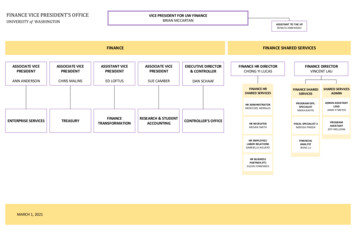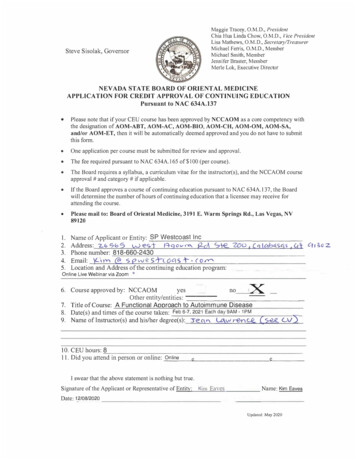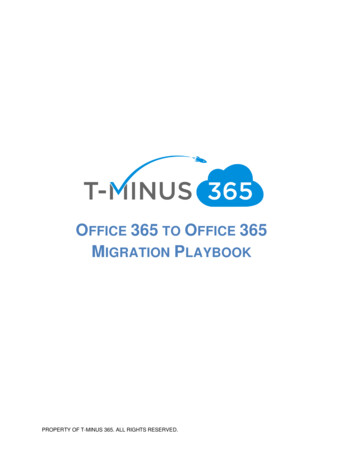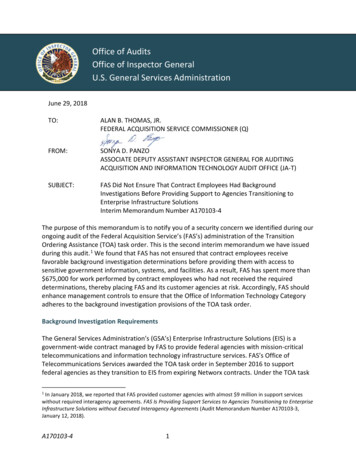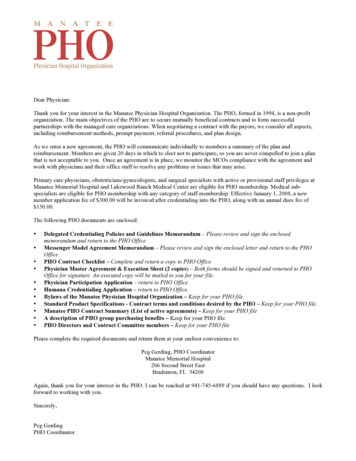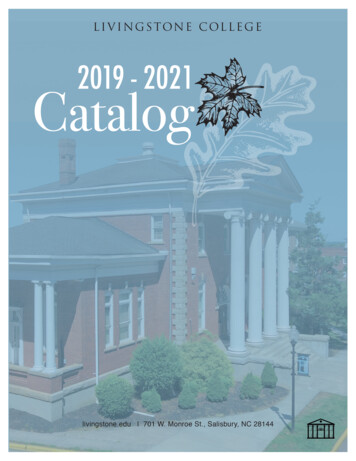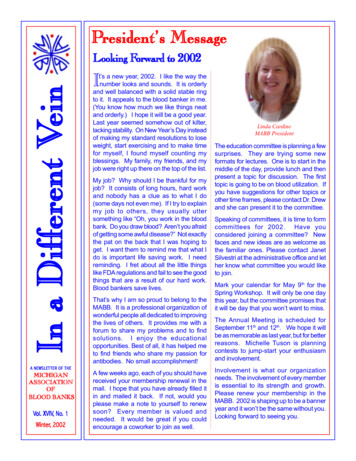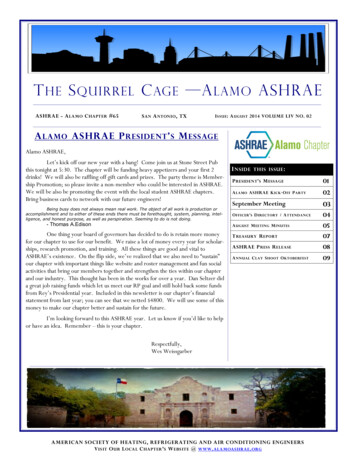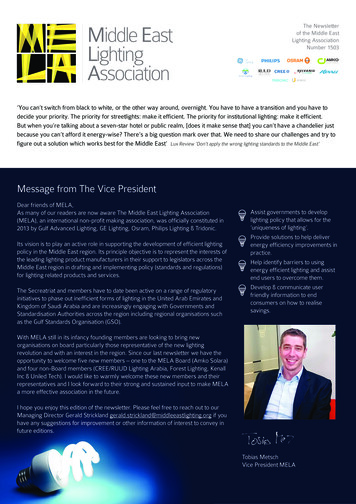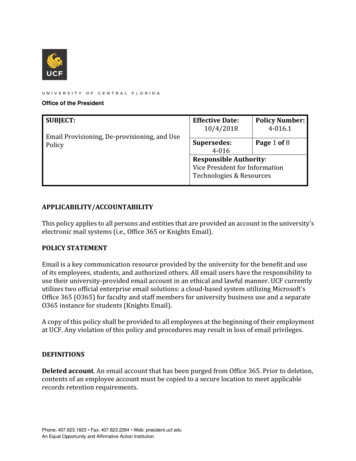
Transcription
Office of the PresidentSUBJECT:Email Provisioning, De-provisioning, and UsePolicyEffective Date:10/4/2018Policy Number:4-016.1Supersedes:Page 1 of 84-016Responsible Authority:Vice President for InformationTechnologies & ResourcesAPPLICABILITY/ACCOUNTABILITYThis policy applies to all persons and entities that are provided an account in the university’selectronic mail systems (i.e., Office 365 or Knights Email).POLICY STATEMENTEmail is a key communication resource provided by the university for the benefit and useof its employees, students, and authorized others. All email users have the responsibility touse their university-provided email account in an ethical and lawful manner. UCF currentlyutilizes two official enterprise email solutions: a cloud-based system utilizing Microsoft’sOffice 365 (O365) for faculty and staff members for university business use and a separateO365 instance for students (Knights Email).A copy of this policy shall be provided to all employees at the beginning of their employmentat UCF. Any violation of this policy and procedures may result in loss of email privileges.DEFINITIONSDeleted account. An email account that has been purged from Office 365. Prior to deletion,contents of an employee account must be copied to a secure location to meet applicablerecords retention requirements.Phone: 407.823.1823 Fax: 407.823.2264 Web: president.ucf.eduAn Equal Opportunity and Affirmative Action Institution
Disabled account. Email account status that prevents the user of the account fromaccessing it. This account status can be changed by UCF IT email administrators or theInformation Security Office.Employee. A person who has been officially hired by UCF and has an employee record inthe PeopleSoft HR system.Enterprise Resource Planning System (ERP). PeopleSoft Student Administration, HumanResources (HR), or Financials systems: ERP is the authoritative source of information onStudent, HR and Financials data, and identity data on all persons and entities affiliated withUCF.Expired account. Email account status that prevents incoming email from being accepted.After six months of expired status the account is deleted. This account status can bechanged by UCF IT email administrators or the Information Security Office.Knights Email. UCF’s student email system, supported by a distinct instance of Office 365.Students and current employees may obtain an account at no cost for personal use. KnightsEmail is the official communication channel for messages from university offices to students.Non-Employee. A person affiliated with, but not officially employed by UCF.Office 365 (O365). An email service offered by Microsoft Corporation. Office 365 is theemail platform supporting UCF’s enterprise email service and also Knights Email forstudents.Phishing. An attempt to acquire sensitive information such as usernames, passwords, andcredit card numbers, often for malicious purposes, through electronic communications,such as email or text messages.Pre-Employment. The status of a person who has accepted employment at UCF, and isprovisioned in the ERP system, but whose official start date has not occurred.Retiree. An individual who has completed all steps necessary to retire from the universityand is officially listed in the ERP system as a Retiree.Spam. Unsolicited and undesired electronic messages containing advertisements forproducts or services.Sponsored Account. A computer or email account created for individuals that do not fitstandard employee or student roles, such as consultants, contractors, guests, courtesyappointees, etc.Student. A person who has been admitted into full-time, part-time, or transient studentstatus and who has a student record in the PeopleSoft student information system. Seepolicy 4-010 Student Email for further details.4-016.1 Email Provisioning, De-provisioning, and Use 2
University Business. In the context of this policy, electronic mail messages that a personcovered by this policy may send or receive in the conduct of their universityresponsibilities.GENERAL POLICYEmail Data OwnershipThe university owns all university email accounts in all Microsoft Office 365 instances. Thecontent in the faculty and staff O365 instance is owned by the university. Universitybusiness must be conducted using the Microsoft Office 365 faculty and staff instance.The Knights Email system is for personal use, and therefore the content is personallyowned. All email content in O365 instances is subject to copyright and other intellectualproperty rights under applicable laws and university policies.Email Privacy and Right of University AccessThe university will make every attempt to keep email messages secure; however, privacy isnot guaranteed and users should have no general expectation of privacy in email messagessent through university email accounts. Under certain circumstances, it may be necessaryfor university IT staff or other authorized university officials to access university emailaccounts. These circumstances may include, but are not limited to, maintaining the system,investigating security or abuse incidents or investigating violations of this or otheruniversity policies; and, in the case of Microsoft Office 365 Accounts, violations ofMicrosoft’s Acceptable Use Policy or the university’s contracts with Microsoft. University ITstaff or university officials may also require access to a university email account in order tocontinue university business where the university email account holder can no longeraccess the university email account for any reason (such as death, disability, illness, orseparation from the university.) Such access will be on an as-needed basis and any emailaccessed will only be disclosed to individuals who have been properly authorized and havean appropriate need to know or as required by law. The university may access the contentsof email accounts for purposes of e-discovery, or officially sanctioned investigations. Allemail users are bound by the appropriate acceptable use policies of both the university andMicrosoft.Data Retention and PurgingEmail messages held in the O365 accounts for faculty and staff are subject to university’sstorage and email retention policies. O365 mailboxes are set to maximum storage size ofone hundred gigabytes and ten years’ retention. Any email over the ten-year period will beautomatically purged, but may be archived by the account holder prior to the end of theten-year retention period.4-016.1 Email Provisioning, De-provisioning, and Use 3
Email Record RetentionIt is the responsibility of employees to preserve university records, including emails orinstant messages in particular circumstances: 1) those who have actual knowledge ofmatters in which it can be reasonably anticipated that a court action will be filed, 2) asubpoena has been served or notice of same has been given, 3) records are sought pursuantto an audit or similar pending or possible investigation, and 4) public records retention asrequired by Florida statutes or federal agencies.Appropriate Use and User ResponsibilityHighly restricted data, as defined by policy 4-008.1 Data Classification and Protection, mustnot be stored or transmitted within the university email system unless the data isencrypted. Restricted data, as defined by policy 4-008.1 Data Classification and Protection,may be transmitted or stored within the university email system without data encryption.Sending highly restricted or restricted data from the university email systems to a nonuniversity email system without data encryption is prohibited. Refer to the university’spolicy 4-008.1 Data Classification and Protection for further definitions and protections onrestricted and highly restricted data.Please refer to policy 4-006.1, Broadcast Distribution of Electronic Mail, for the university’srequirements on mass email communications.In order to prevent the unauthorized use of email accounts, the sharing of passwords isstrictly prohibited. Each individual is responsible for his/her account, including thesafeguarding of access to the account. All email originating from an account is assumed tohave been authored by the account holder, and it is the responsibility of that holder toensure compliance with this policy.All incoming email is scanned for malware and spam. Suspected messages are blocked fromthe user’s inbox. Due to the complex nature of email, it is not possible to guaranteeprotection against all spam or malware, nor is it possible to prevent blocking of certainlegitimate messages. It is therefore incumbent on each individual to use proper care toprevent the spread of malware. In many cases, messages containing or pointing to malwareor phishing content appear to be sent from a friend, coworker, or other legitimate sources.Users should not click on links in an email message or open attachments unless the user iscertain of the nature of the message and the sender. Suspicious emails should beforwarded, as an attachment, to sirt@ucf.edu where they can be investigated.Personal Email AccountsTo avoid confusing official university business with personal communications, and toadhere to Florida public records laws, employees must not use non-university emailaccounts (e.g., personal Hotmail, Yahoo, or Gmail accounts) to conduct university business.Forwarding university business related email to a non-university personal email account isnot permitted in order to prevent potentially sensitive university information from beingsent to external, non-secure email systems.4-016.1 Email Provisioning, De-provisioning, and Use 4
PROCEDURESEmail Account CreationEmployeesUpon completion of the hiring or pre-employment process, and when an employeerecord is created in the Human Resources system, each employee becomes eligiblefor an email account. Creating an email account is initiated through an electronicform by the department’s Human Resources Liaison, or delegate, and is based on theemployee’s role and relationship with the university. Email accounts are createdbased on the official name of the employee as reflected in the Human Resourcessystem.The standard format for an email account is: firstname.lastname@ucf.edu. Facultyand staff can establish an alternate, or alias, account name by using the self-serviceprocess in the myUCF portal.Faculty and staff members can create a Knights Email account in the Knights Emailinstance for general personal use by using the online form athttp://knightsemail.ucf.edu.Once student applicants are matriculated, the student becomes eligible for a KnightsEmail account. Students use the above university-provided provisioning applicationto create their customized Knights Email account.When a student is employed by the university (e.g., part-time employment, GTA,etc.), an email account may be requested by the HR Liaison in the O365 faculty andstaff email system for the purposes of conducting university business.Sponsored AccountsUniversity employees may request a UCF Sponsored Account and an associatedemail account. Sponsored account requests are reviewed on a case-by-case basis forindividuals who are not UCF faculty, staff, or students. Sponsored accounts andonline resource access can be requested using the forms and procedures found onthe Service Desk web page at https://it.ucf.edu. Sponsored accounts areestablished for one year and must be renewed annually.Departmental Email AccountsRequests for shared departmental accounts will be accommodated, but requiredesignation of an account holder who will administer the addition, deletion, ormodification of users within the account, as well as manage the account as per theseguidelines.4-016.1 Email Provisioning, De-provisioning, and Use 5
Granting AccessThe university may access the contents of email accounts for purposes of e-discovery, orofficially sanctioned investigations at the request of the chief compliance and ethics officer,chief audit executive, or Office of the General Counsel.Active Employees and StudentsRequest for access to an active employee’s email account requires approval from theprovost, chief compliance and ethics officer, chief audit executive, or Office of theGeneral Counsel.Former EmployeeRequest for access to a former employee’s email account requires approval from theprevious manager and approval from the dean or director of the employee’s collegeor administrative department.Email Account De-ProvisioningNotwithstanding the following procedures, university executives (e.g., president, provost,Office of the General Counsel, etc.) reserve the right to revoke email privileges for cause atany time.Faculty and Staff who leave before retirementFaculty and staff members who leave the university will have email privilegesremoved effective on their last worked day. If such separation is for cause, emailprivileges may be immediately revoked without notice. Upon request, automaticreplies will be added to the email account to notify senders of the former employee’sstatus and/or new contact information. An email account may also be assigned to amanager, or delegate, upon appropriate approvals. Contents will remain in theaccount’s mailbox as required by current records retention requirements.Sponsored AccountsSponsored accounts must be renewed annually. Sponsored accounts will becomedisabled if the sponsor of the account fails to renew the account through thesponsored account process. Once disabled, an email account can be re-activatedupon sponsor request.4-016.1 Email Provisioning, De-provisioning, and Use 6
Retired Faculty and StaffFaculty and staff members who have retired from the university will be permitted toretain a university email account as described in UCF policy 3-001.2 UniversityBenefits for Retired Employees and the current UCF-UFF Collective BargainingAgreement.Active Students and AlumniKnights Email accounts are currently not de-provisioned. Students who havegraduated from the university will be permitted to retain their email privileges if theaccount continues to be actively used. In the event the university terminates orotherwise ceases its contractual relationship with Microsoft regarding the KnightsEmail system, all accounts will be deleted. Users will be given the option ofdownloading their data prior to deletion.Expelled StudentsIf a student is expelled from the university, email privileges may be terminatedimmediately at the direction of the Office of Student Rights and Responsibilities.RELATED INFORMATIONFurther information regarding Microsoft’s policies on Acceptable Use, Terms of Use,Privacy and Trademarks can be found 12UCF Policy 2-100.5 Florida Public Records Act—Scope and Compliance rdsActScopeAndCompliance.pdfUCF Policy 2-103.2 Use of Copyrighted Material OfCopyrightedMaterial.pdfUCF Policy 3-206.5 Credit Cart Merchant ditCardMerchant.pdfUCF Policy 4-007.1 Security of Mobile Computing, Data Storage, and CommunicationDevices urityOfMobileDevices.pdfUCF Policy 4-001.1 Retention Requirements for Electronic tionRequirementsForElectronicEmail.pdf4-016.1 Email Provisioning, De-provisioning, and Use 7
UCF Policy 4-002.2 Use of Information Technologies & Resources fInformationTechnologiesAndResources.pdfUCF Policy 4-006.1 Broadcast Distribution of Electronic castDistributionOfElectronicMail.pdfUCF Policy 4-010 Student ntEmailPolicy.pdfUCF Policy 4-209 Export Control tControlPolicy.pdfUCF Policy 4-014 Procurement and Use of Cloud Computing and Data Storage s.pdfINITIATING AUTHORITYVice President for Information Technologies & ResourcesHistory 4-016 12/13/20174-016.1 Email Provisioning, De-provisioning, and Use 8
University employees may request a UCF Sponsored Account and an associated email account. Sponsored account requests are reviewed on a case-by-case basis for individuals who are not UCF faculty, staff, or students. Sponsored accounts and online resource access can be requested using the forms and procedures found on the Service Desk web page at
